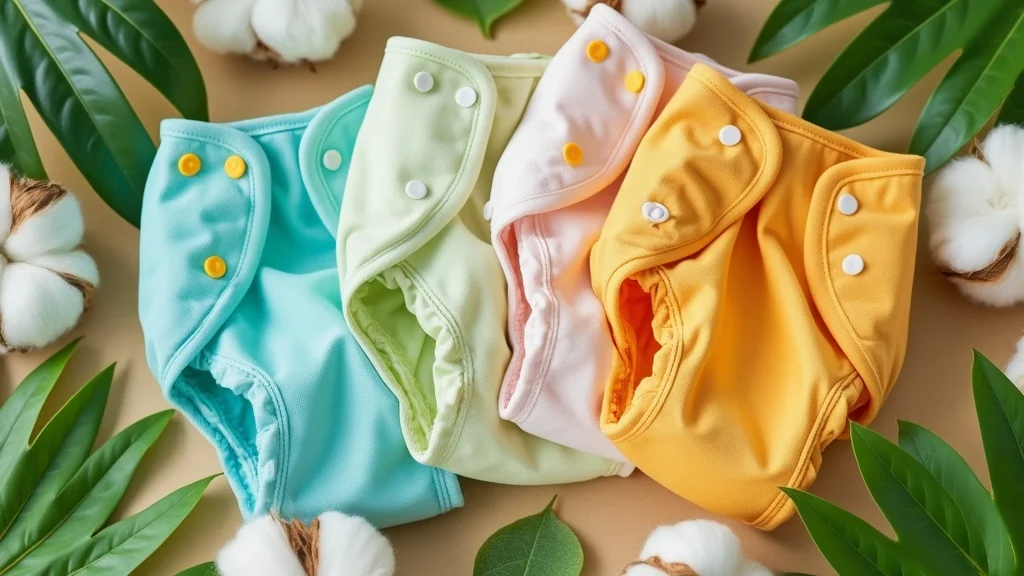The global shift towards eco-friendly parenting has fueled a surge in demand for reusable baby cloth diapers. For retailers and distributors, this presents an exciting opportunity to cater to a growing market of conscious consumers. If you’re considering adding baby cloth diapers wholesale to your inventory, you’re on the right track!
This guide will cover everything you need to know about sourcing, selling, and selecting wholesale cloth diapers for babies. From understanding market trends to ensuring quality, we’ve got it all. And, of course, there’s a touch of humor to make the journey fun—because who says business can’t be enjoyable?

Why Invest in Baby Cloth Diapers Wholesale?
The reusable cloth diaper market is booming, with parents embracing sustainability and cost-efficiency. Here’s why you should consider venturing into wholesale cloth diapers:
1. Growing Demand for Eco-Friendly Baby Products
Parents today are looking for ways to reduce waste, and reusable cloth diapers are a perfect solution. According to the Natural Resources Defense Council (NRDC), disposable diapers contribute significantly to landfill waste, taking hundreds of years to decompose. Offering cloth diapers positions your business as part of the sustainability movement.
2. Cost-Efficiency for Parents and Retailers
Cloth diapers save parents thousands of dollars over their baby’s diapering years. Retailers can also benefit from bulk pricing when buying wholesale, offering attractive margins while remaining competitive.
3. Customization and Brand Differentiation
Many wholesale suppliers offer customizable designs, allowing you to stand out with unique patterns, eco-friendly materials, and private labeling. For retailers, this is a golden opportunity to build a strong, recognizable brand.
(Fun Note: Who wouldn’t want to sell diapers featuring adorable avocado prints or whimsical unicorns?)
What to Look for in Wholesale Baby Cloth Diapers
When sourcing cloth diapers in bulk, quality is key. Here are some essential factors to consider:
1. Fabric and Material
High-quality materials like organic cotton, bamboo, and microfiber are crucial for absorbency and comfort.
| Material | Key Benefits |
|---|---|
| Organic Cotton | Soft, breathable, hypoallergenic |
| Bamboo | Naturally antibacterial, excellent moisture-wicking |
| Microfiber | Quick-drying, highly absorbent |
2. Adjustable Sizing
Parents prefer cloth diapers that grow with their baby. Look for options with snap closures or Velcro adjustments, ensuring a snug fit for all ages.
3. Eco-Friendly Credentials
Ensure the supplier adheres to sustainable practices. Certifications like GOTS (Global Organic Textile Standard) or OEKO-TEX Standard 100 add credibility and appeal.
4. Easy Maintenance
Parents value cloth diapers that are easy to wash and quick to dry. Emphasize features like stain resistance and durability when marketing your products.
(Pro Tip: Test wash samples from suppliers before committing to a bulk purchase. You’ll thank yourself later.)
5. Variety of Styles
Stocking different diaper types caters to diverse customer preferences. Here are the most popular styles:
| Diaper Style | Description | Best For |
|---|---|---|
| Pocket Diapers | Include a pocket for inserting absorbent pads | Custom absorbency |
| All-in-Ones (AIOs) | Combines an absorbent layer and waterproof shell | Easy, fuss-free usage |
| Prefolds | Foldable rectangles, used with covers | Budget-conscious parents |
| Hybrid Diapers | Combine reusable and disposable components | Flexibility for busy parents |
(Fun Note: It’s like giving parents a diaper buffet—something for everyone!)
How to Source Wholesale Baby Cloth Diapers
Finding the right supplier is crucial for maintaining product quality and ensuring smooth business operations. Here’s how to do it:
1. Research Reputable Suppliers
Look for suppliers with proven track records, positive reviews, and certifications. Platforms like Alibaba, Global Sources, and TradeIndia are excellent starting points.
(Check out our guide to sourcing baby products from China for detailed tips.)
2. Request Samples
Before committing to a large order, request samples to evaluate material quality, stitching, and overall durability.
3. Negotiate Minimum Order Quantities (MOQs)
Some suppliers require high MOQs, which may not suit small businesses. Negotiate for flexibility, especially if you’re testing the waters.
4. Verify Eco-Friendly Practices
Ask for documentation proving sustainable practices, such as dye certifications or organic material sourcing.
5. Consider Shipping and Customs
Factor in shipping costs and potential customs fees when calculating your profit margins. Reliable suppliers will offer transparent shipping terms.
Marketing Your Baby Cloth Diapers
Once you’ve sourced your inventory, the next step is getting them into the hands of eager parents. Here’s how to market them effectively:
1. Highlight Eco-Friendly Benefits
Position your cloth diapers as the eco-conscious choice. Use statistics about waste reduction to appeal to environmentally aware parents.
*(Did you know? The average baby goes through 2,500–3,000 disposable diapers in their first year!)
2. Showcase Designs
Parents love stylish and fun patterns. Use Instagram, Pinterest, and TikTok to showcase your product lineup, pairing visuals with hashtags like #SustainableParenting and #ClothDiaperLove.
3. Offer Educational Content
Educate customers about the benefits of cloth diapering and how to use them. Blog posts, infographics, and videos can be powerful tools. Explore our Ultimate Cloth Diapering Guide for inspiration.
4. Provide Starter Bundles
Create attractive bundles with a mix of diaper styles, inserts, and accessories to encourage first-time buyers to try your products.
5. Partner with Influencers
Collaborate with parenting bloggers or eco-conscious influencers to expand your reach. Their endorsements can build trust and drive sales.
FAQs About Baby Cloth Diaper Wholesale
1. What is the typical profit margin for cloth diapers?
Profit margins for cloth diapers range from 30% to 50%, depending on sourcing costs and retail pricing.
2. How many diapers should a retailer stock initially?
Start with 100–500 diapers, depending on your target market size. Offer a mix of styles to gauge customer preferences.
3. Are cloth diapers better for sensitive skin?
Yes! Cloth diapers made from organic cotton or bamboo are hypoallergenic and reduce the risk of diaper rash, making them a hit with parents of babies with sensitive skin.
4. How long do cloth diapers last?
With proper care, high-quality cloth diapers can last through multiple children, making them a cost-effective choice.
(For washing tips, visit HealthyChildren.org.)
5. Can I customize my wholesale cloth diapers with my brand logo?
Many suppliers offer private labeling options. Adding your logo can help build brand recognition and loyalty.
Conclusion: Why Baby Cloth Diaper Wholesale Is a Smart Investment
Entering the baby cloth diaper wholesale market is more than just a business move—it’s a way to tap into the growing demand for sustainable parenting solutions. By offering high-quality, eco-friendly products, you’ll not only attract conscientious parents but also build a brand that stands for a better future.
Ready to take the plunge? Explore our step-by-step guide to sourcing wholesale baby products to get started today!
(Don’t wait—start building your inventory of baby cloth diapers and watch your business thrive.)

